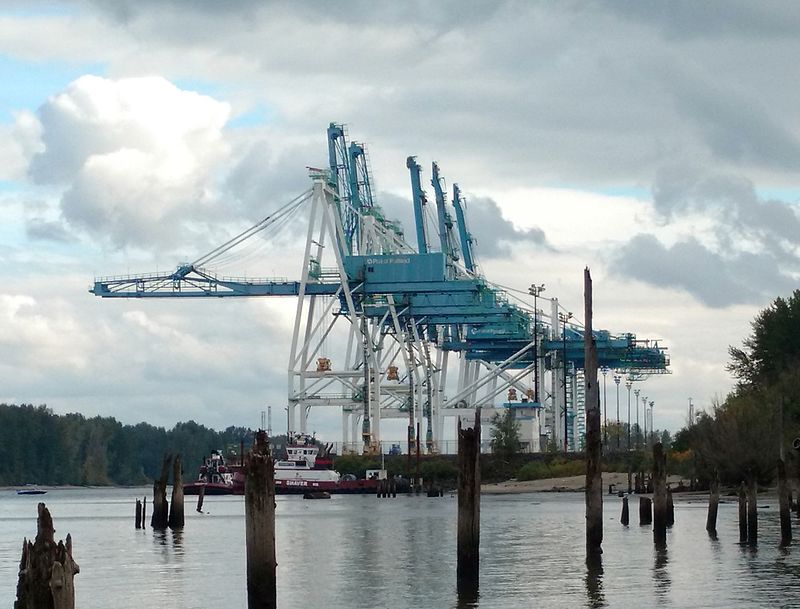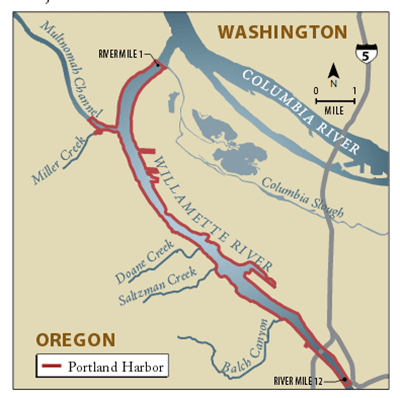Port Sues Former Paint Chemical Maker
MONDAY, JANUARY 9, 2017
The Port of Portland, OR, has recently joined eight western U.S. cities and the state of Washington in filing nuisance lawsuits seeking to hold Monsanto liable for allegedly polluting public waterways with polychlorinated biphenyls (PCBs) made decades ago for paints, sealants and various other applications.
While the federal government banned PCBs in 1979, the Port’s suit claims that chemical producer Monsanto, which was the sole manufacturer of PCBs in the U.S. from 1935 to 1979, “knew for decades that PCBs were toxic and knew that they were widely contaminating all natural resources and living organisms.”

 |
| M.O. Stevens / Wikimedia Commons / CC-By-SA 4.0 |
|
The Port of Portland, OR, has sued Monsanto for contaminating Portland waterways with toxic PCBs. |
The suit also alleges Monsanto knew of the toxicity, citing memos and internal position statements regarding PCBs under the trade name “Aroclors.”
The suit says Monsanto continued producing the chemicals for decades for use in plastics, paints, caulks, lubricants and other products, despite being aware of scientific literature and studies pointing to their danger.
The group of chemicals, which have been known to be toxic to animals and marine life and linked to health effects in humans, do not readily break down once in the environment, according to the Environmental Protection Agency. The agency has classified PCBs as “probable human carcinogens.”
Seeking Cleanup Costs
The Port alleges that PCBs regularly leach, leak, off-gas and escape their intended applications after being released into the environment, contaminating runoff through storm and rain events. Specifically, the suit says PCBs have been found in sediment, water and fish in the Columbia River, McBridge Slough and the Willamette River and the Port has spent money investigating, monitoring, analyzing and remediating PCB contamination and plans to spend “significant sums in the future.”
Reports say it could cost $1.4 billion to clean up contamination in the Portland Harbor alone.
“Any decision to conceal facts about human health should have consequences,” Curtis Robinhold, Port of Portland deputy executive director, said in a statement. “Monsanto reaped huge profits from the manufacture and sale of PCBs, and it is entirely appropriate for those faced with the cost of cleaning up this contamination to hold them accountable.”
“It’s time Monsanto do the right thing and contribute to the clean-up of their own toxic chemicals,” said John Fiske, an attorney hired to help prosecute the case. The Port is represented by Baron & Budd PC and Gomez Trial Attorneys, which also represent the cities of Portland, Seattle, Spokane, San Jose, Oakland, Long Beach, Berkeley, San Diego and the state of Washington.
 |
| EPA |
|
The Portland Harbor was declared a federal Superfund site in 2000. |
The suit, which seeks unspecified damages, also names Solutia Inc. (now a subsidiary of Eastman Chemical Company) and Pharmacia LLC (now owned by Pfizer Inc. and a successor to the original Monsanto Company).
Monsanto Responds
Officials with Monsanto said the lawsuit targets the manufacturer for using PCBs when they were a "lawful and useful product."
“The Port’s case targets a product manufacturer for selling four to eight decades ago a lawful and useful chemical that was used by the U.S. government, the state of Oregon and local cities, and incorporated by industries into many products to make them safer," the statement provided to Portland's NBC News affliate KGW.com.
"PCBs have not been produced in the U.S. for four decades, and the Port is now pursuing an experimental case on grounds never recognized in Oregon history and which threatens to delay and derail years of Portland Harbor Superfund allocation proceedings involving the responsible parties who actually discharged PCBs.
"Most of the prior cases filed by the same out-of-state contingency fee lawyers have been dismissed, and Monsanto believes this Port case similarly lacks merit and conflicts with the ongoing Portland Harbor case,” the company said.
Cases Pending
D+D News reached out to Fiske for updates on the other pending cases. He said, "In Spokane, Judge Mendoza denied Monsanto’s Motion to Dismiss and that case is moving toward trial."
"In the California cities’ cases, San Diego, Long Beach, Oakland, Berkeley, and San Jose have all filed Amended Complaints after the judges granted leave to amend. None of those cases are dismissed, but rather on file as amended and awaiting rulings from the judges.
"The City of Portland and City of Seattle cases have yet to yield rulings. Monsanto has not yet responded to the State of Washington and Port of Portland cases," he added.
Tagged categories: Business matters; Coating chemistry; Coatings raw materials manufacturers; Coatings Technology; Construction chemicals; Environmental Protection; EPA; Laws and litigation; Raw materials









